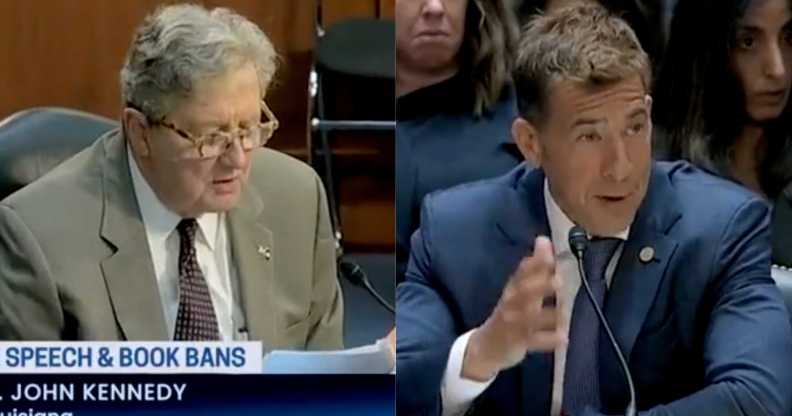Senate book ban hearing gets weird as senator John Kennedy reads sexually explicit passage

Senator John Kennedy took the Senate by surprise when he read out an explicit excerpt from ‘All Boys Aren’t Blue’ (C-SPAN)
A Senate Judiciary Committee hearing took a rather unexpected turn this week when Republican senator John Kennedy performed a sexually explicit reading.
As Republican politicians and conservative groups push for more and more literary works to be banned from schools and libraries, Democrats, anti-censorship activists, and education experts are in strong opposition.
According to the American Library Association, the number of attempts to ban books in the United States doubled between 2021 and 2022.
Kennedy, 71, read a passage from the YA book All Boys Aren’t Blue by George M. Johnson in an attempt to get across his point that parents should have a right to ban certain books from classrooms.
The non-fiction book follows the life of author Johnson growing up as a queer Black man and is the second-most banned book in the United States.
Suspending everyone in the Senate in disbelief, Kennedy recited: “I put some lube on and got him on his knees. And I began to slide into him from behind. I pulled out of him and kissed him while he masturbated.
“He asked me to turn over while he slipped a condom on himself.”
The senator also read a paragraph from graphic memoir Gender Queer by Maia Kobabe – the most banned book in the United States.
When he finished reading, Kennedy asked a Democratic witness was “suggesting that only librarians should decide if the two books that I just referenced should be available to kids.”
While Republicans and Democrats alike were able to agree that some books are inappropriate for children of a certain age, Democrats maintained that using the most sexually explicit excerpts from already controversial books was a scapegoat for a much larger issue.
All Boys Aren’t Blue author Johnson has spoken extensively about the drama surrounding their memoir.
In an interview with NPR last year, Johnson said that if parents don’t want their child to read the book, they should opt their child out, rather than trying to block all students from accessing it and possibly censoring information that some students might be in need of.
“Students … have publicly said on record that works like mine have saved their lives, works like mine have helped them name their abusers, works like mine have helped them come to terms with who they are and feel validated in the fact that there is somebody else that exists in the world like them,” said Johnson.
The author also noted that school curriculums are “still heavily geared towards the straight, white, male teen.”
“And so when we now have the ability to put books into curriculum that tell other stories, that tell stories that are non-white, that tell stories that are non-heterosexual, they’re trying to take them out across the board because, you know, it’s like, ‘Oh, my God, how dangerous would it be if young white teens had to actually learn about the other people who exist in society with them?'”
And that point was made at Tuesday’s (12 September) Senate hearing.
Democratic senator of Illinois and judiciary committee chair Dick Durbin said at the hearing: “Let’s be clear, efforts to ban books are wrong, whether they come from the right or the left.
“In the name of protecting students, we’re instead denying these students an opportunity to learn about different people and difficult subjects.”
Durbin also pointed out that “no one is advocating for sexually explicit content to be available in an elementary school library or in the children’s section of a library. But no parent should have the right to tell another parent’s child what they can and cannot read in school or at home. Every student deserves access to books that reflect their experiences and help them better understand who they are.”
Meanwhile, Alexi Giannoulias, Illinois’s secretary of state and state librarian noted that, while Kennedy’s dramatic reading was “disturbing, especially coming out of your mouth”, it wasn’t a valid argument in favour of parents being able to ban books from schools.
“Of course, there are books that are not age-appropriate. But that’s what being a parent is all about – doing your best to keep an eye on what your children read and what they consume,” he told the Senate.

